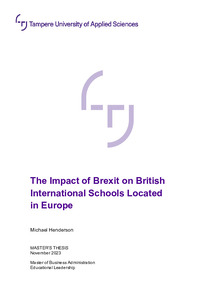The impact of Brexit in British international schools located in Europe
Henderson, Michael (2023)
Henderson, Michael
2023
All rights reserved. This publication is copyrighted. You may download, display and print it for Your own personal use. Commercial use is prohibited.
Julkaisun pysyvä osoite on
https://urn.fi/URN:NBN:fi:amk-2023112832428
https://urn.fi/URN:NBN:fi:amk-2023112832428
Tiivistelmä
On 23 June 2016, voters in the United Kingdom (UK) decided to terminate the UK's membership of the European Union – an event commonly referred to as Brexit. While some of the realities of living in the aftermath of Brexit are already acknowledged and understood, the topic of education in schools is still relatively unknown and evolving. This paper aims to look at the practices of British international schools in Europe and make recommendations to a specific British international school (Campion School) to ensure that it remains an attractive proposition for pupils and parents in a post-Brexit era.
The thesis looks at the issue through the lens of four threats:
• Demand for student places in international schools
• Supply of teachers working in international schools
• Curriculum implemented in schools
• Ontological challenges relating to international education.
Purposive and expert sampling methods were used to email a questionnaire to the Headteachers/Principals of British and international schools in Europe. Qualitative and quantitative data was gathered from 42 respondents based on the abovementioned threats. The results were then triangulated and compared to the working practices of Campion School. Proposals were then made to safeguard Campion’s existence and ensure that the school remains at the forefront of British/international education in Greece.
The study acknowledges that other events of global significance, such as Covid-19 and the conflict in Ukraine, blur the overall picture. However, at the time of writing, Brexit does not pose an existential threat to British international schools in Europe. Overall, pupil numbers remain buoyant. Very few schools have adapted their overt curriculum, and ontological challenges did not convey the need to move away from a school with a British identity. However, the study identified a shift in university applications from the traditional flow of applications to the UK to one where pupils applied to multiple countries, including many in the EU. Staff recruitment has become problematic regarding cost and time, but not unsurmountable for schools to overcome.
The thesis looks at the issue through the lens of four threats:
• Demand for student places in international schools
• Supply of teachers working in international schools
• Curriculum implemented in schools
• Ontological challenges relating to international education.
Purposive and expert sampling methods were used to email a questionnaire to the Headteachers/Principals of British and international schools in Europe. Qualitative and quantitative data was gathered from 42 respondents based on the abovementioned threats. The results were then triangulated and compared to the working practices of Campion School. Proposals were then made to safeguard Campion’s existence and ensure that the school remains at the forefront of British/international education in Greece.
The study acknowledges that other events of global significance, such as Covid-19 and the conflict in Ukraine, blur the overall picture. However, at the time of writing, Brexit does not pose an existential threat to British international schools in Europe. Overall, pupil numbers remain buoyant. Very few schools have adapted their overt curriculum, and ontological challenges did not convey the need to move away from a school with a British identity. However, the study identified a shift in university applications from the traditional flow of applications to the UK to one where pupils applied to multiple countries, including many in the EU. Staff recruitment has become problematic regarding cost and time, but not unsurmountable for schools to overcome.
